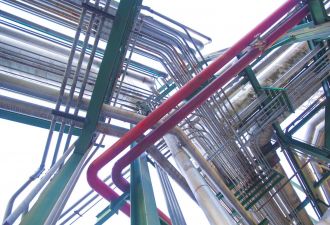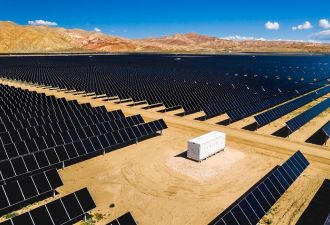Despite solar stocks plummeting in a "bizarre confluence of contradictory events," low-cost capital, DOE funding and VC are pouring into the market. Here's a roundup of some recent solar funding events.
Sunnova Energy secured approximately $300 million in debt and equity funding for its residential solar energy business last month. When you're in the top 10 in a residential solar finance field that includes SolarCity, Sungevity, SunPower, Sunrun and Vivint, it's possible for a significant player like Sunnova to get drowned out by the other news, noise and hype. The transaction includes a conduit facility arranged by Credit Suisse, and an equity financing round led by Triangle Peak Partners. Additional equity investors include business development companies sponsored by Franklin Square Capital Partners, "sub-advised by GSO Capital Partners LP, the Credit Division of the Blackstone Group," as per a release. Franklin Square managed $13.6 billion in assets last year. The announcement brings Sunnova’s total fundraising to almost $900 million. Sunnova CEO John Berger told GTM in a recent interview, “We are bigger than people think, and we are seeing continued market-share growth."
Sunrun, a rooftop solar financier and installer, is looking to borrow $230 million to finance residential PV systems, according to reports in Bloomberg. The debt will have a five-year term and will let Sunrun refinance in the asset-backed securities market.
Past SolarCity investor Silver Lake Kraftwerk has agreed to invest $100 million, SolarCity Chairman Elon Musk will invest $10 million and SolarCity CEO Lyndon Rive will invest $3 million in SolarCity's zero coupon convertible senior notes. "We believe that SolarCity is a highly attractive long-term investment opportunity," said Josh Raffaelli, managing director at Silver Lake Kraftwerk in a release, adding, "We think [SolarCity's] unparalleled access to solar-specific tax equity, asset-backed security and debt clearly differentiates it from providers that are funding projects constantly via equity markets." The notes will be senior, unsecured obligations of the firm, "will not bear ordinary interest, and the principal amount of the notes will not accrete. It is expected that the notes will be convertible into shares of SolarCity's common stock, based on an initial conversion rate of 30.303 shares of common stock per $1,000 principal amount of the notes."
Solar sales firm Sungevity recently signed a deal with energy retailer Viridian while displacing SolarCity at the firm. An astute reader listened in on earnings call and points out that as part of the partnership, Viridity's parent company "Crius Energy received a one-time grant of 120 million warrants to purchase Series C Preferred Shares of Sungevity with a five year term, at a strike price of US$0.09 per share. The warrants vest at the latter of the one year anniversary of the Reseller Agreement or once certain performance criteria have been met."
Trina Solar announced that two of its overseas subsidiaries, Trina Solar U.S. and Trina Solar Singapore, have signed a total of $90 million in financing facility agreements with Wells Fargo and Barclays Bank.
Blue Raven Solar, a solar originator that describes itself as "one of the fastest-growing residential solar energy providers," won an undisclosed investment ("eight figures," according to trusted sources) from Peterson Partners, a Salt Lake City-based investment firm. Co-founders Ryan Lee and Tyson Peschke had three employees at this time last year. Today the company has a direct sales network with 439 total employees in nine different states operating out of 24 offices. The company offers PPAs but also sells "a vastly superior proprietary solar product that allows us to enter states with little to no competition from other solar companies." Peterson Partners has invested in Vivint and Vivint Solar, JetBlue, Azul, EnergySolutions and 130 other companies.
Sighten is an early-stage solar software confronting a largely U.S. problem -- disproportionate solar soft costs. The startup landed a $3.5 million round A of venture funding from Obvious Ventures. Sighten's platform looks to drive down soft costs by addressing the "solar lifecycle, from sales to asset management," according to the firm's CEO, Conlan O'Leary. Soft costs include customer acquisition, installer overhead, financing, contracts, inspection, permitting, interconnection and installation labor. That list now accounts for about 50 percent of the cost of a residential solar system, according to a 2013 NREL report. Customer acquisition makes up roughly 10 percent of a residential solar system’s total cost. Sighten's customer is "anyone installing or selling residential solar."
The U.S. DOE's SunShot program announced $22.7 million for 23 projects to "significantly reduce the costs for solar energy systems across a variety of technologies." The awardees are:
- Amtech Systems ($930,664): Amtech is developing a field-effect passivation technology to improve cell efficiency in c-Si solar cells.
- Aurora Solar ($400,000): Aurora is developing a web-based application that calculates the solar potential of a building’s roof.
- CelLink ($2,500,000): CelLink is developing a flexible conductive backplane suited to the requirements of rear-contact solar cells and power electronics.
- Cogenra Solar ($5,499,551): Cogenra, now owned by SunPower, is developing a 50-megawatt module line based on an approach that reduces metal shading, eliminates gaps between cells, and decreases resistance. (More GTM coverage here.)
- Concurrent Design ($1,000,000): Installed as the “single point of permitting,” the company equips a home for expansion of solar, storage, backup generation, load control, and islanding.
- EdgePower ($495,248): EdgePower is building hardware and software to integrate the controllable HVAC and lighting loads of a building with forecast and solar PV production.
- Enact Systems ($948,636 in two projects): Enact is developing an end-to-end platform for automation of sales, operations, design, and financing of projects that leverage property-assessed clean energy financing. The company is also developing an end-to-end operational workflow analytics platform to expedite sales and installation of solar PV projects.
- Folsom Labs ($296,000): Folsom is developing a software-based system that generates many of the documents and permits that inspectors and local authorities require for solar arrays in their jurisdiction.
- GeoCF ($773,500): GeoCF has a comprehensive software platform for utility-scale solar project evaluation and development.
- Halo Industries ($1,000,000): Halo will use "uniform axial forces for the brittle fracture of silicon ingots, leading to the ability to fabricate silicon sheets and wafers with any desired thickness," eliminating kerf losses, with the ability to manufacture wafers ranging from 10 µm to 200 µm in thickness.
- kWh Analytics ($599,974): kWh Analytics looks to use data analytics to prove that FICO is merely a contributing factor, rather than the only factor, that influences customer repayment.
- Nevados Engineering ($773,124): Nevados Engineering is creating a single-axis tracker to help solar developers build projects on lands that are raised and uneven.
- PowerScout ($1,500,000): PowerScout aims to lower customer-acquisition costs and drive better sales, marketing, and underwriting decisions with data analysis and machine learning.
- Ra Power Management ($500,000): RPM is developing a cloud-based software platform that manages the financial and operational functions of third-party financed solar projects.
- SafeConnect Solar ($999,893): SafeConnect is commercializing electronic balance-of-system componentry that allows safer residential PV systems to be installed more quickly.
- SenSanna ($500,000): SenSanna's multi-sensor systems provide distributed wireless monitoring that lets operators understand grid conditions on a local level, analyze stresses introduced by PV fluctuations, and develop local energy storage and control strategies.
- Sistine Solar ($1,000,000): Sistine Solar has developed a technology to create solar panels of absolutely any color, shade, or pattern that can open up the residential rooftop market in the U.S. to the 25 million households that are part of homeowner associations with restrictive aesthetic covenants.
- SolarRetina ($499,894): SolarRetina will provide distribution grid planners with a tool that provides on-demand, evidence-based analysis of the grid impacts of distributed solar derived from real-life, real-time solar generation data crowdsourced from customer-sited solar installations.
- Sunfield Semiconductor ($144,000): Module-level monitoring using low-frequency magnetic fields which penetrate non-ferrous conductors like PV cells may be able to detect and locate series arc faults at a significantly lower cost.
- SunPower ($681,676): SunPower aims to change the way that companies collect, filter, and process solar project data by using a combination of software and hardware automation.
- Sunrun ($900,000): Sunrun, in collaboration with Clean Power Research, will develop the first end-to-end system for automatic permit set generation, submission and approval.
- UtilityAPI ($762,530): UtilityAPI is automating the process of authorizing, collecting and cleaning electricity data from utilities.



